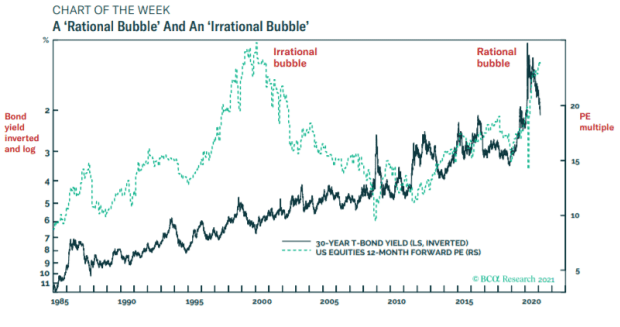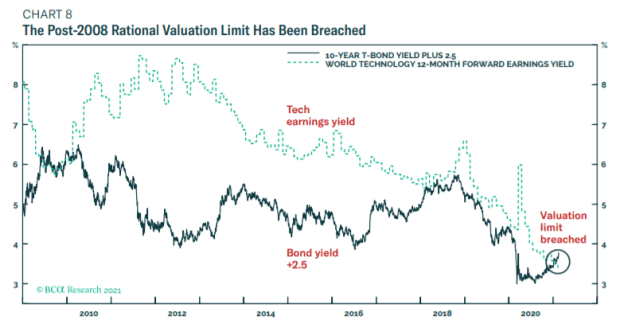This post was originally published on this site
The action this week has been centered on the bond market, not the stock market, as Treasury yields have climbed in reaction to the progress on a new stimulus package as well as the global rollout of COVID-19 vaccines.
The S&P 500 SPX, -0.44% has declined for three straight days, but by only 0.5% — suggesting the stock market hasn’t panicked about the moves that have sent the yield on the 10-year Treasury TMUBMUSD10Y, 1.304% to about 1.30%, and the 30-year yield TMUBMUSD30Y, 2.091% up to 2.10%.
Dhaval Joshi, chief European investment strategist for BCA Research, has said for some time that low yields meant the rally into stocks and other assets, made sense — a rational bubble, if you will. “Rational, because the nosebleed valuations are justified by a fundamental driver. And not just any fundamental driver, but the most fundamental driver of all – the bond yield,” he writes.

But not now. Forward price-to-earnings multiples have been rising even as yields have climbed. The earnings yield in the most growth-focused sector, technology, has now been surpassed by the bond yield plus a fixed amount, as the chart shows.

There are three ways this can resolve. One, is for stock prices to decline; another is for bond yields to decline; a third is for neither to move but earnings to rise, to improve stock valuations. (That third factor looks unlikely, for now, at the tail end of earnings season.)
“Our current recommendation is to stay tactically neutral for the next few weeks to see whether risk-asset valuations can revert to rationality. This means keep existing investments in the market, but hold fire on new deployments of cash,” says Joshi. “If valuation reverts to rationality in any of the three ways listed above, then investors can safely deploy new cash into the market.”
And what about if not? Joshi says if the market turns irrational, the key will be to look if investors at longer-time horizons join the party. “As investors with longer and longer time horizons join the irrational bubble, there will be well-defined moments of heightened fragility, at which correction risk increases. This is what burst the irrational bubble in 2000, and will burst any new irrational bubble.”
The buzz
Uber Technologies UBER, -2.98% fell in premarket trade after the U.K. Supreme Court ruled its drivers are workers and not self-employed, which will entitle them to minimum wage and paid holidays.
Facebook FB, -1.53% Chief Executive Mark Zuckerberg was scheduled to talk to Australian Treasurer Josh Frydenberg after the company imposed a block on sharing Australian-produced news, a response to measures to make online firms pay publishers. Facing the same potential law, Alphabet’s GOOG, -0.52% Google has reached settlements with publishers including News Corp., which owns MarketWatch, the publisher of this report.
Computing giant IBM IBM, +0.63% is considering selling its loss-making IBM Watson Health unit, according to The Wall Street Journal.
Streaming device maker Roku ROKU, -0.87% reported a surprise profit on stronger-than-forecast revenue. Cloud-service provider Dropbox DBX, +1.12% reported stronger-than-forecast earnings and revenue for the fourth quarter. Applied Materials AMAT, -1.97%, the microchip equipment maker, beat fiscal first-quarter profit estimates and guided to better current-quarter estimates than analysts had estimated.
French automobile maker Renault RNO, -5.01% fell in Paris and scrapped its dividend after reporting an €8 billion loss for 2020. Renault also said the peak of the microchip shortage confronting auto makers should be reached in the second quarter.
The flash version of purchase managers indexes from Markit are due at 9:45 a.m., followed by existing home sales data.
The latest development on Sen. Ted Cruz leaving electricity-deprived Texas for Cancún, Mexico — for which he has apologized — is the report that he left his poodle, Snowflake, at home in Houston.
The markets
U.S. stock futures ES00, +0.18% NQ00, +0.33% advanced.
Oil CL.1, -2.38% fell back below $60 per barrel, and the U.S. dollar DXY, -0.34% slipped.
Random reads
Now that NASA’s Perseverance rover has safely touched down on Mars, it will be tasked with collecting rock samples that might hold evidence of past life.
A 3-D printer producing veggie steaks? That’s the goal of this startup that just raised $29 million.
Need to Know starts early and is updated until the opening bell, but sign up here to get it delivered once to your email box. The emailed version will be sent out at about 7:30 a.m. Eastern.
Want more for the day ahead? Sign up for The Barron’s Daily, a morning briefing for investors, including exclusive commentary from Barron’s and MarketWatch writers.

